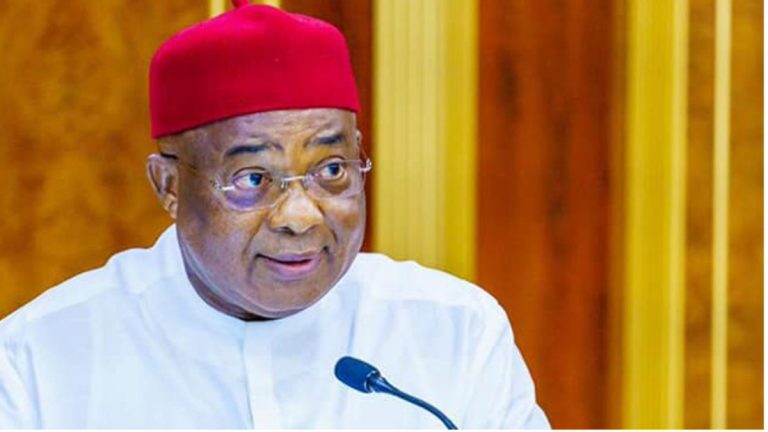From Godwin Tsa, Abuja
The Human Rights Writers Association of Nigeria (HURIWA) has called on Governor Hope Uzodinma of Imo State to focus on addressing the challenges of rural neglect, infrastructure decay, and insecurity following his signing of the state’s 2025 budget.
While commending the governor’s progress on federal road projects, HURIWA expressed concern over the poor state of governance in many of Imo’s local government areas, describing them as “ungoverned spaces.”
In a statement by its national coordinator, Emmanuel Onwubiko, the group urged the governor to focus on developing rural infrastructure, which it described as the backbone of the state’s economy.
The association noted that farmers in rural areas face significant challenges transporting their produce to markets due to bad roads, further exacerbating poverty and economic stagnation. “If Governor Uzodinma can prioritise rural development in the remaining years of his tenure, it would leave an enduring legacy,” HURIWA stated.
The prominent pro-democracy and civil rights advocacy group observed that Governor Uzodinma recently signed into law a budget of ₦807 billion, increased from the initial ₦756 billion proposed. The budget allocates ₦694.8 billion (86.09%) to capital expenditure and ₦112.3 billion (13.91%) to recurrent expenditure. HURIWA noted that while these figures suggest an ambitious plan for infrastructure development, the realities on the ground paint a grim picture of neglect and poor governance.
The association observed that more than 60% of Imo State’s geography, particularly local government areas, remains neglected, with inadequate governance, insecurity, and decaying infrastructure. HURIWA highlighted the dire state of rural roads and the lack of basic amenities, even in urban areas such as Owerri, Orlu, and Okigwe. Many residents in these areas rely on ponds for drinking water due to the absence of running water, forcing many residents to rely on ponds for drinking water.
A particular example cited by HURIWA is the road linking Okwe to Arondizuogu, which was either built by the Niger Delta Development Commission (NDDC) or a previous state administration. “The road has now become impassable, with erosion threatening to cut it off completely. This road serves as a major entry point to communities in Onuimo, Okigwe, and Ideato North LGAs from the Okigwe axis,” the association warned that if the road collapses entirely, it would isolate numerous communities and worsen their plight.
HURIWA also drew attention to the neglect of roads built decades ago within Owerri and other urban areas, which have been left to deteriorate. The association stated that this neglect extends to essential services, including traffic control in Owerri, where lawlessness prevails. “Drivers ignore traffic rules, traffic controllers resort to begging for money, and police officers appear disengaged. Key roads like the one connecting Rockview Hotel to Assumpta Cathedral are arbitrarily blocked in the evenings, causing unnecessary chaos,” HURIWA highlighted.
Despite these concerns, HURIWA acknowledged Governor Uzodinma’s commendable efforts in rehabilitating federal roads linking Owerri to Okigwe and Owerri to Orlu. These highways have significantly improved connectivity and ease of travel for residents. However, the association emphasised that governance must not stop at these highways and called for similar attention to be given to rural areas and neglected urban infrastructures.
HURIWA urged the governor to focus on developing rural infrastructure, which it described as the backbone of the state’s economy. The association noted that farmers in rural areas face significant challenges transporting their produce to markets due to bad roads, further exacerbating poverty and economic stagnation. “If Governor Uzodinma can prioritise rural development in the remaining years of his tenure, it would leave an enduring legacy,” HURIWA stated.
The association also appealed to the governor to address the security challenges that have become a significant threat to economic growth in Imo State and the South-East region. It emphasised the need for the governor to remain in the state to oversee governance directly, rather than spending extended periods in Abuja for political engagements. “As the elected governor of Imo State, it is imperative that he stays in Owerri to restore law and order and ensure that governance reaches every corner of the state,” HURIWA added.
The group expressed scepticism about the implementation of the “utopian” projects listed in the budget, questioning where the allocated funds would ultimately go. The association highlighted the disconnect between the budget’s ambitious figures and the lived realities of Imo residents, citing ministries like Water Resources and Agriculture as examples of departments whose impact remains largely unseen.
HURIWA noted that the Ministry of Works and Infrastructural Development received the highest allocation of ₦297.5 billion (42.8%), followed by Transport with ₦101 billion (14.5%) and Power and Electrification with ₦74.8 billion (10.8%). However, the association stressed that these funds must be utilised effectively to benefit rural and underserved areas.
In conclusion, HURIWA urged Governor Uzodinma to bridge the gap between urban and rural development, address insecurity, and restore essential services such as water and electricity. Improved traffic management and law enforcement in Owerri were also recommended to restore order in the state capital.
“Governor Uzodinma has the opportunity to redefine governance in Imo State by focusing on areas that matter most to the people,” HURIWA stated. “With less than three years remaining in his tenure, he must prioritise rural development, infrastructure rehabilitation, and security to leave an indelible mark. Imo deserves a governor who governs, not an absentee leader.”
